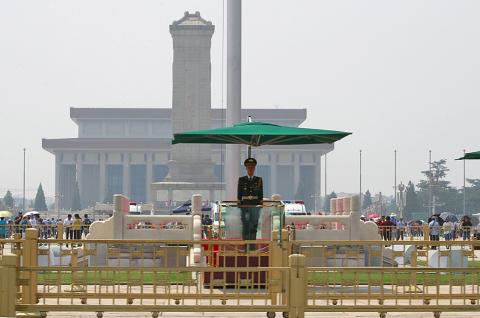Beijing yesterday marked 30 years since the Tiananmen Square Massacre with a wall of silence and extra security.
Police checked the identification cards of every tourist and commuter leaving the subway near Tiananmen Square, the site of the pro-democracy protests that were brutally extinguished by tanks and soldiers on June 3 and 4, 1989.
Foreign journalists were not allowed onto the square at all or warned by police not to take pictures.

Photo: EPA-EFE
Officials told one reporter that “illegal media behavior” could affect visa renewals.
Meanwhile, Washington marked the occasion by hailing the “heroic” movement of 1989.
The Chinese Communist Party detained several pro-democracy advocates in the run-up to yesterday, while popular livestreaming sites conspicuously shut down for “technical” maintenance.
Searches for the term “Tiananmen” on the Sina Weibo platform yesterday displayed the official logo of the 70th anniversary of the founding of communist China.
Over the years, the party has censored any discussion of the protests and crackdown, which left hundreds, possibly more than 1,000 people, dead — ensuring that people either never learn about what happened or fear to discuss it.
The party and its high-tech police apparatus have tightened control over civil society since Chinese President Xi Jinping (習近平) took office, rounding up pro-democracy advocates, rights lawyers and even Marxist students who sympathized with labor movements.
Countless surveillance cameras are perched on lampposts in and around Tiananmen Square.
“It’s not that we don’t care. We know what happened,” said a Didi Chuxing driver. “But how can I tell you when the DiDi Chuxing app is recording our conversation?”
“Today’s China has changed,” he added. “If you have money, you have everything. Without money, you dare not open your mouth.”
It was largely business as usual at Tiananmen yesterday: Hundreds of people, including children waving small Chinese flags while sitting on their parents’ shoulders, lined up to watch the daily flag-raising.
However, the line moved slowly due to extra security, with identification cards matched on facial recognition screens.
When asked whether it occurred to her that she was visiting the square on the 30th anniversary of the Tiananmen Square Massacre, a nursing school graduate in her 20s from eastern Shandong Province said: “What do you mean? No, it didn’t cross my mind.”
Her mother added: “We don’t think of that past.”

INVESTIGATION: The case is the latest instance of a DPP figure being implicated in an espionage network accused of allegedly leaking information to Chinese intelligence Democratic Progressive Party (DPP) member Ho Jen-chieh (何仁傑) was detained and held incommunicado yesterday on suspicion of spying for China during his tenure as assistant to then-minister of foreign affairs Joseph Wu (吳釗燮). The Taipei District Prosecutors’ Office said Ho was implicated during its investigation into alleged spying activities by former Presidential Office consultant Wu Shang-yu (吳尚雨). Prosecutors said there is reason to believe Ho breached the National Security Act (國家安全法) by leaking classified Ministry of Foreign Affairs information to Chinese intelligence. Following interrogation, prosecutors petitioned the Taipei District Court to detain Ho, citing concerns over potential collusion or tampering of evidence. The

Seventy percent of middle and elementary schools now conduct English classes entirely in English, the Ministry of Education said, as it encourages schools nationwide to adopt this practice Minister of Education (MOE) Cheng Ying-yao (鄭英耀) is scheduled to present a report on the government’s bilingual education policy to the Legislative Yuan’s Education and Culture Committee today. The report would outline strategies aimed at expanding access to education, reducing regional disparities and improving talent cultivation. Implementation of bilingual education policies has varied across local governments, occasionally drawing public criticism. For example, some schools have required teachers of non-English subjects to pass English proficiency

‘FORM OF PROTEST’: The German Institute Taipei said it was ‘shocked’ to see Nazi symbolism used in connection with political aims as it condemned the incident Sung Chien-liang (宋建樑), who led efforts to recall Democratic Progressive Party (DPP) Legislator Lee Kun-cheng (李坤城), was released on bail of NT$80,000 yesterday amid an outcry over a Nazi armband he wore to questioning the night before. Sung arrived at the New Taipei City District Prosecutors’ Office for questioning in a recall petition forgery case on Tuesday night wearing a red armband bearing a swastika, carrying a copy of Adolf Hitler’s Mein Kampf and giving a Nazi salute. Sung left the building at 1:15am without the armband and apparently covering the book with a coat. This is a serious international scandal and Chinese

TRADE: The premier pledged safeguards on ‘Made in Taiwan’ labeling, anti-dumping measures and stricter export controls to strengthen its position in trade talks Products labeled “made in Taiwan” must be genuinely made in Taiwan, Premier Cho Jung-tai (卓榮泰) said yesterday, vowing to enforce strict safeguards against “origin laundering” and initiate anti-dumping investigations to prevent China dumping its products in Taiwan. Cho made the remarks in a discussion session with representatives from industries in Kaohsiung. In response to the US government’s recent announcement of “reciprocal” tariffs on its trading partners, President William Lai (賴清德) and Cho last week began a series of consultations with industry leaders nationwide to gather feedback and address concerns. Taiwanese and US officials held a videoconference on Friday evening to discuss the